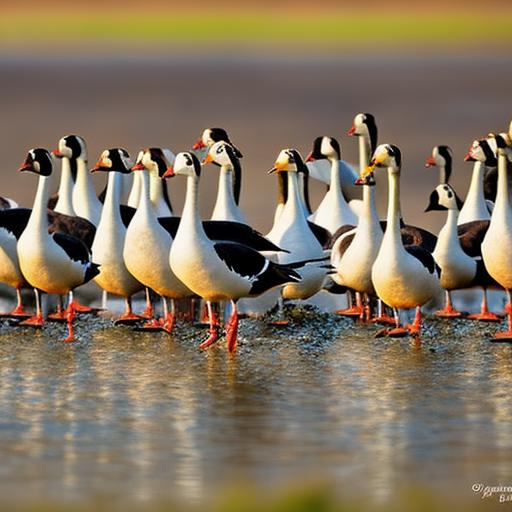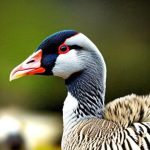African Geese, also known as African Grey Geese or Graylag Geese, are a domesticated breed of geese that originated in Africa. They are believed to have been domesticated over 4,000 years ago and were originally used for their meat and feathers. Today, African Geese are popular not only for their meat but also for their pest control abilities and companionship.
African Geese are medium to large-sized birds with a distinctive appearance. They have a long neck and a sturdy body, with males being slightly larger than females. Their plumage is typically gray or gray-brown, with some variations in color. One of the most unique features of African Geese is their knob, which is a fleshy protuberance on the top of their beak. This knob is more prominent in males and is used for display during courtship.
Key Takeaways
- African geese are a domesticated breed of geese that are native to Africa.
- Keeping African geese can provide benefits such as meat, eggs, and pest control.
- Housing and shelter for African geese should be spacious, secure, and provide access to water.
- Feeding and nutrition for African geese should include a balanced diet of grains, greens, and protein.
- Health and wellness of African geese can be maintained through regular check-ups, vaccinations, and proper hygiene.
Benefits of Keeping African Geese
There are several benefits to keeping African Geese on your property. One of the main advantages is their ability to control pests and manage weeds. African Geese are natural grazers and will happily eat grass, weeds, and insects. They can help keep your lawn or garden free from unwanted pests and can reduce the need for chemical pesticides.
Another benefit of keeping African Geese is their egg production and meat quality. African Geese are known for laying large eggs that are rich in nutrients. They can lay up to 40 eggs per year, making them a valuable source of fresh eggs for your family or for sale. Additionally, the meat of African Geese is flavorful and tender, making it a popular choice for many culinary dishes.
In addition to their practical benefits, African Geese also provide companionship and entertainment. They are social birds that enjoy the company of humans and other animals. They can be trained to follow simple commands and can become quite attached to their owners. Watching African Geese interact with each other and with their environment can be a source of entertainment and joy.
Housing and Shelter for African Geese
When it comes to housing and shelter for African Geese, there are a few important considerations to keep in mind. First, African Geese need a secure and spacious area to roam and graze. They should have access to fresh water for swimming and drinking, as well as plenty of grass or vegetation to eat. It is also important to provide them with shelter from extreme weather conditions, such as heat or cold.
African Geese can be housed in a variety of structures, including sheds, barns, or specially designed goose houses. The housing should be well-ventilated and provide protection from predators. It should also have enough space for the geese to move around comfortably. A good rule of thumb is to provide at least 10 square feet of space per goose.
If you are building or buying a shelter for African Geese, there are a few tips to keep in mind. Make sure the structure is sturdy and secure, as geese can be strong and may try to escape. Provide nesting boxes or areas for the geese to lay their eggs. Consider adding a small pond or water feature for the geese to swim in. Finally, make sure the shelter is easy to clean and maintain, as geese can be messy animals.
Feeding and Nutrition for African Geese
Proper feeding and nutrition are essential for the health and well-being of African Geese. They have specific dietary requirements that need to be met in order for them to thrive. A balanced diet for African Geese should consist of a combination of grains, greens, and protein.
African Geese should be fed a commercial poultry feed that is specifically formulated for geese. This feed should contain a balance of grains, vitamins, and minerals that meet the nutritional needs of the geese. In addition to the commercial feed, African Geese should also have access to fresh grass or vegetation. They are natural grazers and will enjoy eating a variety of greens.
It is important to avoid overfeeding African Geese, as this can lead to obesity and other health issues. Follow the recommended feeding guidelines provided by the manufacturer of the poultry feed. Additionally, make sure the geese have access to clean, fresh water at all times. Water is essential for digestion and overall health.
Health and Wellness of African Geese
Like any other animal, African Geese are susceptible to certain health issues and diseases. It is important to be aware of these potential problems and take steps to prevent them. Common health issues in African Geese include respiratory infections, parasites, and foot problems.
Respiratory infections can occur in African Geese if they are exposed to cold or damp conditions. To prevent respiratory infections, make sure the geese have access to a dry and well-ventilated shelter. Keep their bedding clean and dry, and provide them with plenty of fresh air.
Parasites, such as mites or worms, can also affect the health of African Geese. Regularly inspect the geese for signs of parasites, such as itching or feather loss. If you suspect a parasite infestation, consult with a veterinarian for appropriate treatment options.
Foot problems can occur in African Geese if they are kept on hard or rough surfaces for extended periods of time. Make sure the geese have access to soft ground or grass to walk on. Regularly inspect their feet for signs of injury or infection.
In addition to preventing health issues, it is important to maintain the overall wellness of African Geese. This includes providing them with a balanced diet, regular exercise, and mental stimulation. Spend time with your geese, interact with them, and provide them with toys or other forms of enrichment.
Breeding and Reproduction of African Geese

African Geese have a specific breeding season, which typically occurs in the spring or early summer. During this time, the males will engage in courtship displays to attract a mate. These displays can include honking, head bobbing, and wing flapping.
Once a pair has formed, they will mate and the female will lay her eggs. African Geese typically lay their eggs in a nest that they build on the ground. The female will lay one egg every two days until she has laid a clutch of 5-10 eggs.
The incubation period for African Geese is approximately 28-30 days. During this time, the female will sit on the eggs to keep them warm and provide them with the necessary humidity. It is important to provide a quiet and secure area for the female to incubate her eggs.
Once the eggs hatch, the goslings will be cared for by both parents. They will be able to walk and swim shortly after hatching and will start to eat solid food within a few days. It is important to provide the goslings with a safe and secure area to grow and develop.
Behavioral Traits of African Geese
African Geese are social birds that live in groups or flocks. They have a hierarchical social structure, with dominant individuals leading the group. The dominant geese will often take charge of protecting the flock and will sound an alarm if they sense danger.
Communication among African Geese is primarily vocal. They have a variety of calls and honks that they use to communicate with each other. These calls can vary in pitch and intensity depending on the situation.
African Geese are also known for their strong bond with their mate or partner. Once a pair has formed, they will stay together for life. They will often display affection towards each other, such as preening or nuzzling.
Training and Handling African Geese
Training and handling African Geese can be a rewarding experience, but it requires patience and consistency. It is important to start training and handling the geese from a young age, as they are more receptive to learning during this time.
When training African Geese, use positive reinforcement techniques, such as treats or praise. Start with simple commands, such as “come” or “stay,” and gradually increase the difficulty of the commands as the geese become more comfortable with the training process.
When handling African Geese, it is important to approach them calmly and gently. Avoid sudden movements or loud noises, as this can startle the geese. Use slow and deliberate movements when picking up or holding the geese.
It is also important to establish trust and respect with the geese. Spend time with them on a regular basis, interact with them, and provide them with attention and affection. This will help build a strong bond between you and the geese.
Common Challenges in Keeping African Geese
Keeping African Geese can come with its fair share of challenges. One of the main challenges is predators. African Geese are vulnerable to predators such as foxes, raccoons, and birds of prey. It is important to provide them with a secure shelter and to take steps to deter predators from entering their enclosure.
Environmental factors can also affect the health and well-being of African Geese. Extreme heat or cold can be detrimental to their health. Make sure they have access to shade or shelter during hot weather, and provide them with extra bedding or insulation during cold weather.
Another challenge in keeping African Geese is their tendency to be noisy. They are vocal birds and will often honk or call out, especially if they sense danger or if they are separated from their flock. If noise is a concern, consider keeping the geese in a location that is away from neighbors or invest in soundproofing measures.
Resources for Further Information on African Geese
If you are interested in learning more about African Geese, there are several resources available. Books such as “The Complete Guide to Raising Geese” by Dave Holderread and “Storey’s Guide to Raising Ducks” by Dave Holderread provide comprehensive information on raising and caring for geese.
Websites such as the American Livestock Breeds Conservancy (ALBC) and the Backyard Chickens forum also provide valuable information and resources for African Geese enthusiasts. These websites offer forums where you can connect with other geese owners and ask questions.
Additionally, there may be local organizations or clubs in your area that focus on African Geese or poultry keeping in general. These organizations can provide support, advice, and networking opportunities for geese owners.
If you’re interested in keeping African geese, you may also find this article on the incubation period for goose eggs helpful. Understanding the incubation period is crucial for successfully hatching goslings and ensuring their healthy development. Check out this informative article at https://poultrywizard.com/breeding-geese/what-is-the-incubation-period-for-goose-eggs/. Additionally, if you’re considering expanding your poultry collection, you might want to learn about when guinea fowl lay eggs. Discover more about guinea fowl breeding and egg-laying habits at https://poultrywizard.com/breeding-guinea-fowl/when-do-guinea-fowl-lay-eggs/. Lastly, if you’re looking for tips on creating a suitable floor for your chicken coop, this article provides valuable insights on the subject. Find out more at https://poultrywizard.com/keeping-chickens/floor-of-chicken-coop/. Happy reading and happy poultry keeping!
FAQs
What are African geese?
African geese are a breed of domestic goose that originated in Africa. They are known for their large size, distinctive knob on their beak, and gentle temperament.
What do African geese eat?
African geese are herbivores and primarily eat grass, weeds, and other vegetation. They can also be fed commercial waterfowl feed to ensure they are getting all the necessary nutrients.
How should African geese be housed?
African geese should be provided with a secure shelter to protect them from predators and the elements. They also need access to a pond or other body of water for swimming and grooming.
How do you care for African geese?
Caring for African geese involves providing them with a balanced diet, fresh water, and a clean living environment. Regular health checks and vaccinations are also important to keep them healthy.
Are African geese good for pest control?
African geese are known to be good at controlling pests such as insects and weeds in a garden or farm. Their foraging behavior helps keep unwanted pests in check.
Meet Walter, the feathered-friend fanatic of Florida! Nestled in the sunshine state, Walter struts through life with his feathered companions, clucking his way to happiness. With a coop that’s fancier than a five-star hotel, he’s the Don Juan of the chicken world. When he’s not teaching his hens to do the cha-cha, you’ll find him in a heated debate with his prized rooster, Sir Clucks-a-Lot. Walter’s poultry passion is no yolk; he’s the sunny-side-up guy you never knew you needed in your flock of friends!







